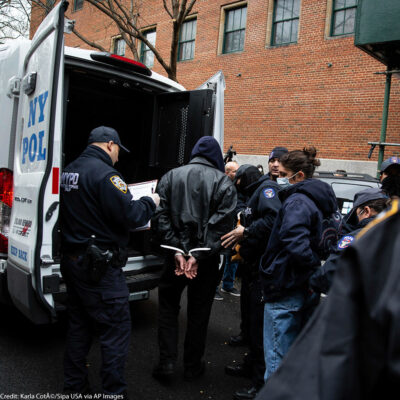
Over the last few weeks, a surge of texts and phone calls have gone out from local politicians. Most of them focus on one issue: crime. Worried about the rising crime? Want to keep you and your family safe? Vote for me. I'll make sure to fund the police and get the riffraff off our streets, direct quote. Crime is being used as a wedge issue this midterm season, and candidates are stoking fears in hopes to mount a meaningful backlash to recent progress in both policing and criminal legal reform. At the same time, state and national leaders are hard at work seeking to criminalize access to healthcare for trans and pregnant folks. This interest in criminalizing new behaviors while holding the line on age old crime and punishment tactics is a worrying trend.
Joining us today to discuss is Somil Trivedi, senior staff attorney for the ACLU’s Criminal Law Reform Project. Loyal listeners of At Liberty will remember Somil from his time guest hosting earlier this year.
In this episode
Kendall Ciesemier

This Episode Covers the Following Issues
Related Content
- Hawaii Supreme CourtApr 2025

Criminal Law Reform
State Of Hawaiʻi V. Zuffante. Explore Case.State of Hawaiʻi v. Zuffante
In 1994, the Supreme Court of Hawaiʻi held in State v. Kekona that the due process clause of the Hawai‘i Constitution does not require custodial interrogations to be recorded. More than 30 years later, with advances in technology that have made recording far easier, this case asks whether this decision should be reconsidered. The ACLU’s State Supreme Court Initiative, along with the ACLU of Hawai‘i filed an amicus brief arguing that the Supreme Court of Hawaiʻi should now hold that custodial interrogations must be recorded in order to be admissible in court, either as a matter of due process or as an exercise of the Court’s supervisory authority over lower courts.Status: Ongoing - Press ReleaseMar 2025

Criminal Law Reform
Nebraska Lawmakers Hold Hearing On Bill To Reduce Non-safety Traffic Stops. Explore Press Release.Nebraska Lawmakers Hold Hearing on Bill to Reduce Non-Safety Traffic Stops
LINCOLN, Neb. – Yesterday, the Nebraska Legislature’s Judiciary Committee heard testimony on LB 222, a bill that would reduce non-safety traffic stops in Nebraska. The legislation would reclassify certain non-moving equipment violations, such as expired registration tags or improper use of horn, as secondary violations, meaning police could only cite drivers for these infractions if they had already been pulled over for a more serious offense, like speeding or drunk driving. Introduced by State Sen. Terrell McKinney, LB 222 aims to improve road safety and reduce unnecessary law enforcement encounters by having police shift attention away from non-moving violations to prioritize dangerous driving behaviors that contribute to serious traffic crashes. Nebraska’s traffic code currently lists over 300 traffic violations, but more than half of all traffic fatalities in the state involve just two offenses: speeding or driving under the influence. The Center for Policing Equity, a nonprofit research center, submitted written comments in support of the bill, citing benefits that come with shifting enforcement priorities from non-safety traffic stops. “LB 222 represents an educated step towards focusing police time and resources where they are most effective,” said Chris Burbank, former Police Chief of Salt Lake City and consultant with CPE. “Of the more than 100,000 traffic stops reported in Nebraska in 2023, just 1.1% led to an arrest: clear evidence that pretext stops are not an essential crime-fighting tool. The economic and social cost of traffic enforcement for non-safety infractions outweighs any benefit. We can and must do better. The time has come for us to ask of policing, ‘should we?’ as opposed to ‘can we?’” At the hearing, the ACLU of Nebraska shared new polling results showing that Nebraskans broadly support legislation that reduces unnecessary police interactions through non-safety traffic stops. Among the highlights, 70 percent of surveyed voters said they would strongly or somewhat support a law like LB 222 to change certain minor offenses, like an expired registration or cracked windshield, to secondary violations. The civil rights organization said the bill could help reduce racial disparities in law enforcement. Since Nebraska began collecting traffic stop data in 2001, Black, Latine, and Native American drivers have consistently been two to three times more likely to be pulled over or searched by law enforcement than white drivers. “For drivers of color, traffic stops have been a primary entry point to harmful and sometimes deadly interactions with police,” said Jason Witmer, policy fellow for the ACLU of Nebraska. “And Nebraskans of color have long been more likely to be stopped, searched and arrested by police. There is an undeniable psychological impact that comes with that, and not just for folks who are pulled over. Something has to change. LB 222 is an important step in the right direction.” In submitted testimony with a neutral position, national road safety advocates applauded the potential benefits of the legislation. “Limiting non-safety traffic stops is a commonsense way to make the roads safer for everyone,” said Leah Shahum, founder and executive director of Vision Zero Network. “When law enforcement resources are used to pull drivers over for minor equipment violations, such as tinted windows, officers miss opportunities to address actual dangerous behaviors causing the most serious crashes, such as speeding, reckless driving and impairment. The most effective approaches to improving roadway safety are not punitive enforcement for non-safety infractions. Instead, road safety is best advanced by using proactive strategies such as redesigning roads to be safer, managing speeds for safety, improving vehicle safety standards, using technologies to encourage safe behavior and ensuring enforcement is used to address actual road safety threats. By shifting enforcement priorities from non-safety traffic stops, Nebraska can join a growing number of states and cities prioritizing evidence-informed strategies to reduce traffic deaths.” The bill remains with the Judiciary Committee. This year’s legislative session is scheduled to conclude in June.Affiliate: Nebraska - TennesseeMar 2025

Criminal Law Reform
Smart Justice
Just City, Inc. V. Bonner. Explore Case.Just City, Inc. v. Bonner
Shelby County (Memphis), Tennessee, historically set cash bail in criminal cases without stopping to ask whether people would be able to bail out. This practice unnecessarily detained people who could not afford to pay for release, but who would otherwise return to court and live peacefully in their communities. The ACLU Criminal Law Reform Project negotiated a historic settlement with Shelby County to end this practice. In retaliation, the Tennessee legislature passed HB 1719, which prohibits judges from considering an arrestee’s ability to pay when setting bail. This law is unprecedented. Our lawsuit seeks to enjoin Shelby County officials from enforcing it.Status: Ongoing - GeorgiaFeb 2025

Criminal Law Reform
State Of Georgia V. Wierson. Explore Case.State of Georgia v. Wierson
This case asks whether Georgia’s insanity defense statutes can be construed to contain an exception for cases where defendants allegedly triggered their own insanity by discontinuing their medication weeks before the alleged crimes. The State argues for such an exception, even though the text of the insanity defense statutes expressly pins the availability of the defenses to the defendant’s mental condition “at the time of” the alleged crimes. The ACLU’s State Supreme Court Initiative, along with the ACLU of Georgia, filed an amicus brief arguing that even if the State’s interpretation of the statutory text were reasonable, its argument should still be rejected because it contradicts the rule of lenity. The rule of lenity is a well-established canon of statutory construction requiring that, if a criminal statute can reasonably be interpreted in different ways, courts must adopt the interpretation most favorable to the accused.Status: Ongoing
